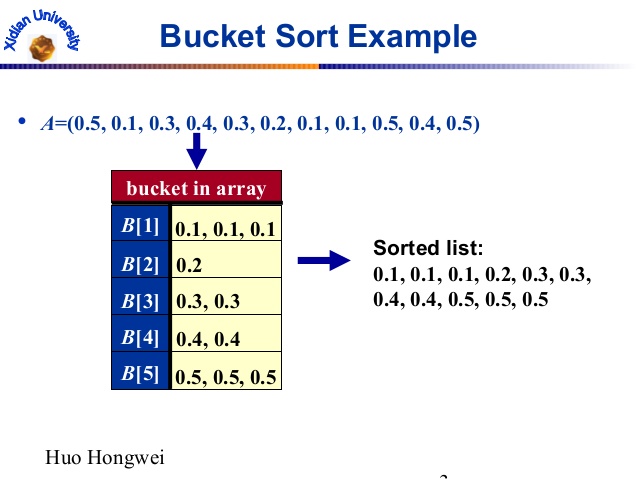Bucket sort is a sorting algorithm also knows as bin sort, it works with distributing elements of an array into a number of buckets.
A bucket is most commonly a type of data buffer or a type of document in which data is divided into regions. Elements or contents in the bucket are unsorted and size of the bucket is fixed at the time of creation.
A bucket has states of empty, non-empty, full or partly full, and overflows.
Each bucket is sorted individually, using any sorting algorithm or bucket sorting. Basically bucket sort is distribution sort and it is cousin of radix sort. Bucket sort can be implemented with comparisons and therefore can also be considered a comparison sort algorithm.
Worst – case performance: O(n2)
Best Case Performance: Ω(n+k)
Average Performance: θ(n+k)
Worst case space complexity: O(n.k)
Pseudo code of Bucket sort:
function bucketSort(array, n) is
buckets ← new array of n empty lists
for i = 0 to (length(array)-1) do
insert array[i] into buckets[msbits(array[i], k)]
for i = 0 to n – 1 do
nextSort(buckets[i]);
return the concatenation of buckets[0], …., buckets[n-1]
Please look at the instance:
Given Series is: [34,12,45,23,1,3,4,36,19,20,28,56,67,48,59]
Distribute these elements into buckets/bins like below

In the above picture elements are distributed among the bins/buckets

In the second picture shows, Elements are sorted in each bin/bucket.
Program implemented for Bucket Sort in Java
import java.util.*;
public class BucketSort{
public static void sort(int[] a, int limit) {
int [] bucket=new int[limit+1];
for (int i=0; i<bucket.length; i++) {
bucket[i]=0;
}
for (int i=0; i<a.length; i++) {
bucket[a[i]]++;
}
int outPos=0;
for (int i=0; i<bucket.length; i++) {
for (int j=0; j<bucket[i]; j++) {
a[outPos++]=i;
}
}
}
public static void main(String[] args) {
int limit=5;
int [] data= {5,3,0,2,4,1,0,5,2,3,1,4};
System.out.println(“Before: ” + Arrays.toString(data));
sort(data,limit);
System.out.println(“After: ” + Arrays.toString(data));
}
}
output of the above program
Before: [5, 3, 0, 2, 4, 1, 0, 5, 2, 3, 1, 4]
After: [0, 0, 1, 1, 2, 2, 3, 3, 4, 4, 5, 5]

Bucket SortSee the other Sorting Techniqueshere
 IT2EDU Empowering Education Through Technology
IT2EDU Empowering Education Through Technology


